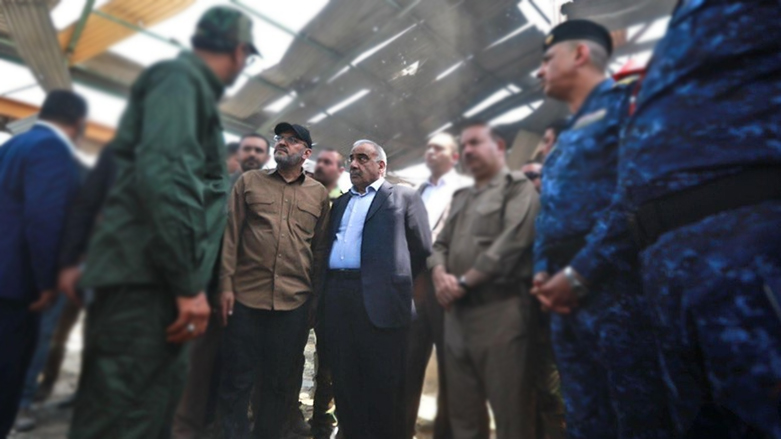Head of pro-Iran militia threatens Americans in Iraq

ERBIL (Kurdistan 24) – The leader of an Iraqi Shia militia, backed by Iran, threatened to take hostage “all” US citizens in Iraq in the event of a conflict between the US and Iran.
Abu Alaa al-Wala’i, head of the Kata’ib Sayyid al-Shuhada (KSS) militia, made the threat on Wednesday during an interview with al-Dijla, an Iraqi television station, close to the Fatah Coalition, which represents the Shiite militias, or Popular Mobilization Forces (PMF), in Iraq’s parliament.
The KSS was established in 2013 during the Syrian civil war. Ostensibly, its purpose was to protect Shi’ite shrines in Syria. However, its declared aim served largely as a recruiting tool. Iraqis ostensibly mobilized to protect the shrines were used to fight the Syrian opponents of Bashar al-Assad’s Baathist regime.
When, a year later, the Sunni terrorist organization, the Islamic State, emerged as a major threat to Iraq, KSS became involved in fighting it, as well.
Although the Islamic State, which once controlled nearly a third of Iraq, has largely been defeated as a territorial entity, many PMF militias remain mobilized. In parts of Iraq, they constitute an undisciplined force that practices mafia-like tactics to extort the population.
In northern Iraq, for example, the presence of militias blocks the return of internally displaced persons, many of whom now live in camps in the Kurdistan Region.
On Wednesday, Wala’i, in the Dijla television studio, proclaimed, “All Americans will be held hostage by the resistance factions in the event of a war.”
His threat—which can only be realized through a decision in Tehran, and then, of course, only in small part—followed a series of Israeli strikes in Iraq, going back to mid-July, on sites associated with PMF elements closely tied to Iran.
READ MORE: Israel attacks Iranian targets in Iraq
Two weeks ago, a weapons depot in Baghdad, reportedly operated by KSS, was demolished in a massive explosion. That explosion, along with rockets stored there, which fired off sporadically, landing in the surrounding south Baghdad neighborhood, killed one person and wounded 37 others.
Among the first responses of Iraqi Prime Minister Adil Abdul Mahdi was to order an end to the practice of keeping such weapons in populated areas.
READ MORE: After depot explosion, Iraqi PM orders munitions out of cities, restricts military aircraft
The incident was among five attacks on PMF targets that culminated Sunday in a strike on a convoy in al Qa’im, along the Syrian border, belonging to another PMF group, Kata’ib Hezbollah. The attack reportedly killed six militiamen.
On Monday, the funerals for the militiamen were held, precipitating popular protests in Baghdad. Abu Mahdi al-Muhandis, who has worked alongside Iran since the 1980s and whom the US has sanctioned for terrorism, charged that Israel was responsible for the attacks and the US was complicit in them.
READ MORE: Drone strikes kill 6 Iran-backed militiamen near Iraqi-Syrian border: source
The US was quick to clarify that it was absolutely not involved. Late on Monday, the Pentagon’s Chief Spokesperson, Jonathan Hoffman, issued a lengthy statement affirming, “US forces did not conduct the recent attack on a convoy or any recent attacks that resulted in the explosion of ammunition storage facilities in Iraq.”
“Statements to the contrary are false, misleading, and inflammatory,” Hoffman continued. “We support Iraqi sovereignty and have repeatedly spoken out against any potential actions by external actors inciting violence in Iraq.”
READ MORE: Iran-Israel conflict spreads in Middle East
The issue is very sensitive for the US, as Iraqi parliamentarians associated with Iran, have seized on the attacks to call for an end to the presence of the US-led coalition in Iraq.
As Hoffman made clear, those forces are in Iraq at the invitation of the Baghdad government. The Iraqi parliament has the authority to tell them to leave—including to leave the Kurdistan Region.
Notably, the Baghdad government has not accused Israel of responsibility. Falih al-Fayyadh, Iraq’s National Security Advisor and formal head of the PMF, described the bombings as “planned foreign acts,” but dismissed Muhandis’ claims as not representing the official position of the Iraqi government.
Muqtada al-Sadr, the Shia cleric whose coalition commands the most seats in parliament, took an even bolder stance. On Monday, as passions flared, he issued a statement, the basic thrust of which was anti-Iranian.
Sadr called for all PMF weapons depots to be placed under the control of the central government. He also called for the withdrawal of “all factions” from Syria—meaning, most pointedly, the Iraqi militias operating there, under Iranian command.
Most, if not all, the attacks were carried out by armed drones. A report, written by David Hearst, formerly a journalist with The Guardian and now editor-in-chief of Middle East Eye, cited an unnamed Iraqi official, who said that Baghdad had initially doubted that Israel could have been responsible, because it is so far away.
However, according to what Hearst was told, Baghdad eventually concluded that Israel was, indeed, responsible, and it had launched the drones from northeastern Syria, in territory held by the Kurdish-led Syrian Democratic Forces (SDF), with the financing and backing of the Saudis.
Hearst gives no evidence, and the unconfirmed report is based on just one anonymous source. Yet it does address a part of the puzzle: how could Israel have sent drones all the way to Iraq? They were launched from a nearby country! But, of course, it was not necessarily SDF-controlled Syria. It is equally plausible they were launched from Saudi Arabia or some other country close to Iraq that is also opposed to Iran.
Editing by Laurie Mylroie
